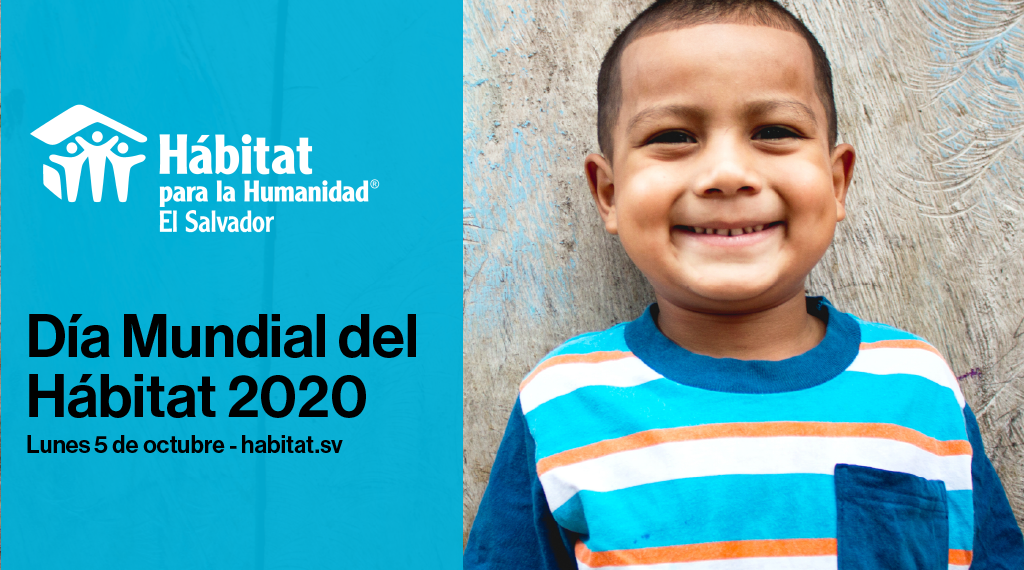Housing market must be considered in national economic recovery plans.
El Salvador, October 5, 2020. El Salvador, October 5, 2020. More than 30 years ago, when the United Nations designated the first Monday of each October as World Habitat Day, we could never have imagined the importance that a safe and dignified home would have today in the face of the pandemic COVID-19, reflects Jonathan Reckford, CEO of Habitat for Humanity International.
According to data from the ECLAC (Economic Commission for Latin America and the Caribbean), in Latin America and the Caribbean, almost 100 million people (21% of the urban population) live in poverty, in unsuitable housing or settlements, with little access to drinking water and sanitation.
In El Salvador, figures from the Regional Study of the Housing Situation in Central America (INCAE, 2016), 8 out of 10 Salvadorans do not have decent housing.
For this reason, within the framework of World Habitat Day, Habitat for Humanity today publishes the report “Cornerstone of Recovery: How housing can help emerging market economies recover from COVID-19”, in which the organization manages to reflect the real contribution of housing to GDP through the use of internationally accepted calculation standards.
The objective was to dimension the role of housing in the economies, representing both investment and housing consumption. For this, the GDP data of 11 countries were examined in detail and it was analyzed whether the housing sector could really support the economic recovery in the world; taking into account that at the same time the economy would be activated, low-income households would be improving to safer and healthier homes and thus, help reduce the spread of COVID-19.
“The results are revealing: Housing market data on GDP in low- to middle-income countries are often incomplete or inaccurate. Efforts to measure the contribution of this sector to the economy have focused mainly on developed countries, ”says Ernesto Castro-García, Area Vice President for Latin America and the Caribbean, at Habitat for Humanity International.
Key results of the study
- Housing contributes more to GDP than expected when both housing investment and housing services are accounted for, averaging more than 13.1% of GDP, in the countries sampled in the report.
- Even so, the contribution to GDP from housing may be even higher,as informal housing and services are likely to be undervalued or not included in national balance sheets at all. Informal housing alone could contribute an additional 1.5% to 2.8% to GDP on average, if properly accounted for.
“The housing market must be part of the countries' economic recovery plans. It is already known that investments in healthy and safe housing have greater benefits than expected: They create jobs, generate income and, particularly in this time of pandemic, would help avoid overcrowding that makes communities more vulnerable to the virus ", assured Ernesto Tobar, Executive Director, of Habitat El Salvador.
Based on the study's findings, international organizations, national and local governments, the private sector, and nonprofit organizations could:
- Start with the housing. Make housing a fundamental intervention to stimulate economic recovery from COVID-19, not only because of its significant effects on the economy, but also because of its social and health benefits.
- Create inclusive housing markets. Use the COVID-19 response stage as an opportunity to create more inclusive housing markets that address multiple income levels, as well as own / rented and formal / informal housing.
In addition to these efforts, the authors of the report recommend promoting stimulus policies that, in cooperation with the international and private sectors, focus on families with low and middle income and, at the same time, include formal and informal markets, as well as rental housing and community organizations.
In addition, they emphasize short-term actions to make suitable property available for housing; open access to financing for developers, families and owners; provide equitable subsidies to families; and offer incentives to lenders and builders.
About Habitat El Salvador
Habitat El Salvador is a non-profit organization with the vision of a world where everyone has a decent place to live. Since 1992, Habitat El Salvador has contributed alongside more than 43 thousand families to build or improve their homes.
About the Report
You can download the Summary of the Report at the following link [Spanish]..
You can download the full report at the following link [English]..
Title: Cornerstone of Recovery: How Housing Can Help Emerging Market Economies Rebound from COVID-19.
Co-authors: Arthur Acolin, associate professor of real estate at the University of Washington; and Marja Hoek-Smit, director of the International Housing Finance Program at the Zell-Lurie Center for Real Estate at the Wharton School at the University of Pennsylvania.
Countries analyzed: Peru, Brazil, Mexico, Egypt, India, Indonesia, Kenya, the Philippines, South Africa, Thailand and Uganda.
Belongs to: Habitat for Humanity Terwilliger Center for Housing Innovation.



Leave a reply